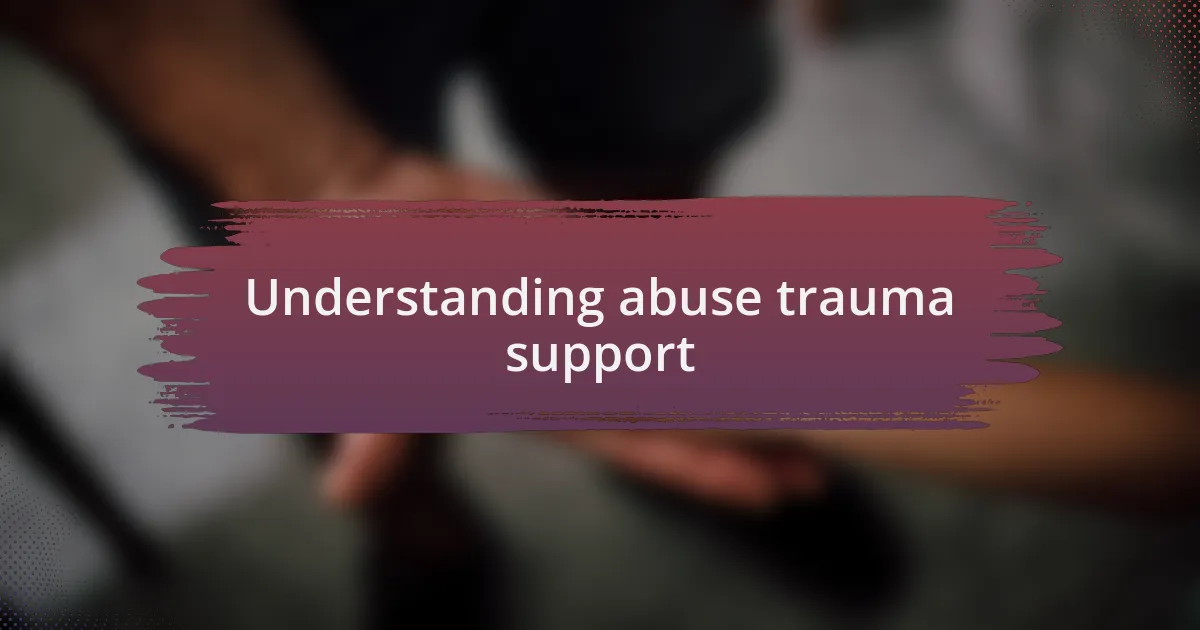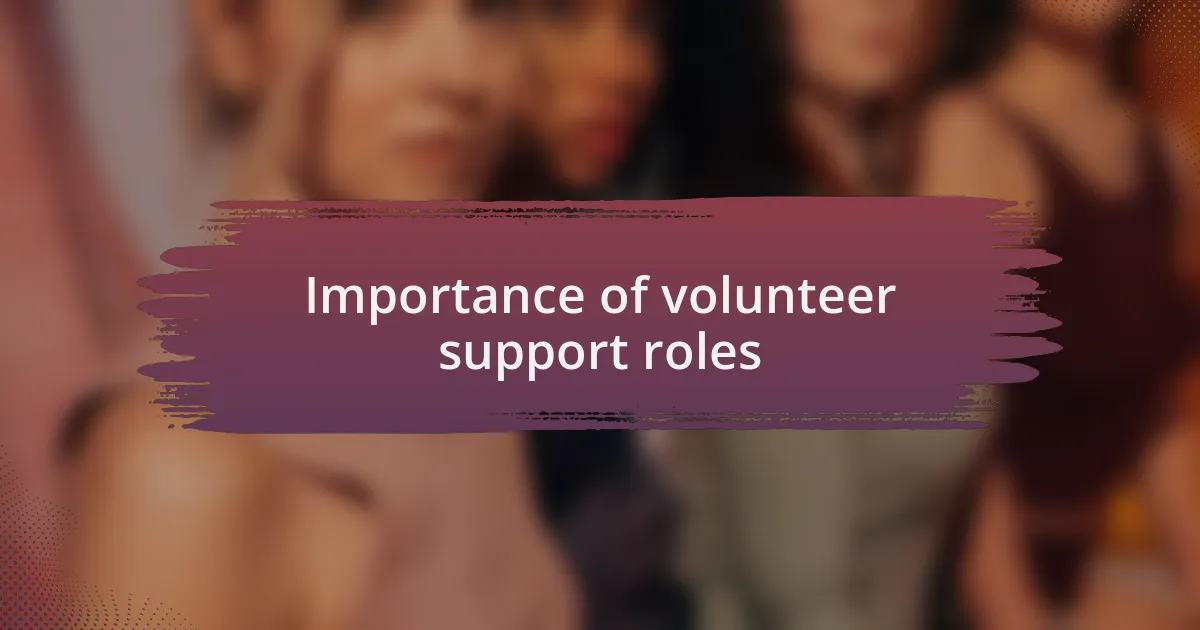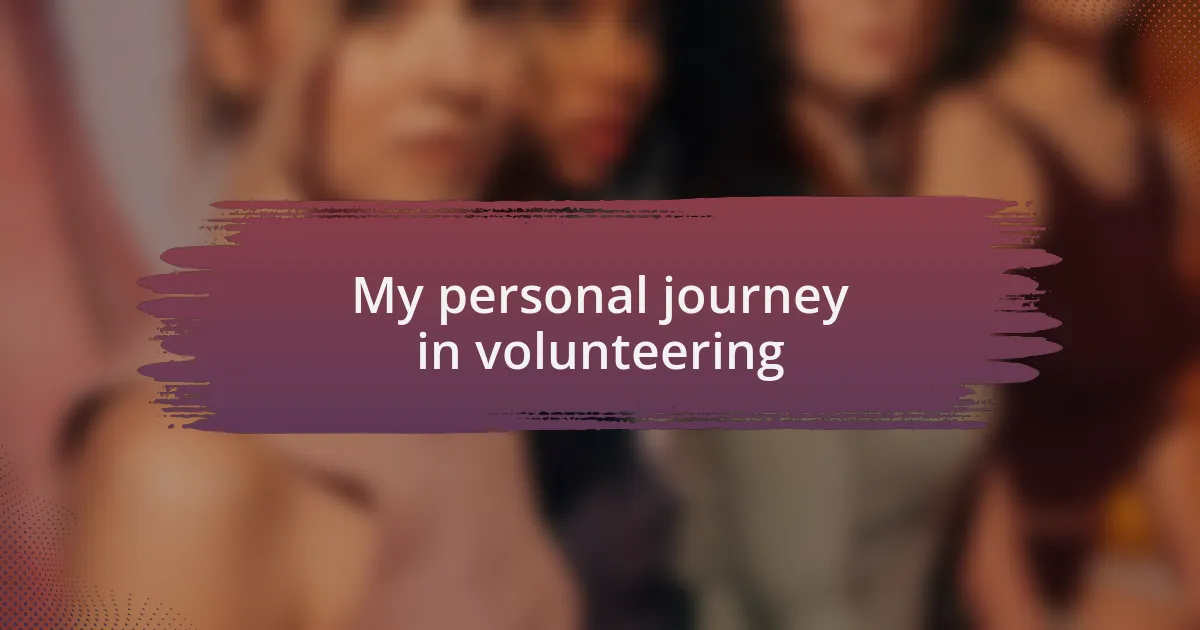Key takeaways:
- Understanding trauma-informed care is essential for providing meaningful support to survivors of abuse.
- Volunteer roles foster human connection, allowing survivors to feel heard and understood, crucial for their healing journey.
- Key skills for effective volunteering include empathy, active listening, and adaptability to meet the unique needs of each survivor.
- Self-care is vital for volunteers to sustain their ability to support others, highlighting the importance of establishing personal boundaries.

Understanding abuse trauma support
Understanding abuse trauma support is crucial because it lays the foundation for healing. I remember when I first learned about trauma-informed care during my volunteering training. The concept resonated deeply with me; it became clear that understanding a survivor’s perspective is essential. How can we offer true support without grasping the impact of their experiences?
From my experience, the emotional aftermath of abuse can feel isolating. I recall a moment when a survivor shared how their trauma made them feel voiceless, lost in their own world. This moment emphasized the importance of creating a space where survivors are heard and validated. What does it mean for someone to feel understood when they’ve been through so much?
Supporting those affected by abuse requires patience and empathy. There were times when a simple, compassionate presence worked wonders—just sitting silently with someone while they processed their emotions. It reinforced for me that sometimes, the greatest support comes not from words, but from a compassionate heart that stands in solidarity with the survivor’s journey.

Importance of volunteer support roles
Volunteer support roles are essential because they provide the human connection that survivors often crave. I remember a day when I partnered with another volunteer to facilitate a small support group. Watching those individuals gradually open up to one another was profoundly moving. It made me realize how transformative it can be when people share their stories in a safe environment—what power lies within such shared vulnerability!
Moreover, volunteers often fill gaps that larger organizations may overlook. There was a time when one survivor praised our outreach efforts in the community, thanking us for bringing resources to a neighborhood that felt forgotten. This experience highlighted how critical it is for volunteers to be present in spaces where support may be lacking. Are we not all responsible for ensuring that no one feels abandoned in their journey toward healing?
I also learned that as volunteers, our lived experiences can be invaluable. In one memorable interaction, I shared my own struggles with overcoming adversity, which led to a deeper connection with a survivor. Their response? “Knowing I’m not alone in this makes all the difference.” This exchange reinforced my belief that volunteer support roles are not just about offering services; they are about building bridges of understanding and compassion.

Types of support roles available
Support roles come in various forms, each tailored to meet the unique needs of survivors. For example, I often found myself helping in crisis intervention, where immediate emotional support is critical. In one instance, a survivor reached out after a distressing event, and simply being there to listen made a world of difference. It made me wonder: how many people feel isolated in their darkest moments, yet just need someone to hear them?
Another important role is that of a peer advocate, which is something I took on later in my volunteering journey. Connecting with individuals who shared similar experiences fostered an incredible sense of trust. I remember guiding a fellow volunteer as they navigated a challenging situation with a survivor. Seeing them grow in confidence while offering support was a potent reminder of the ripple effect that encouragement can create.
Then there’s the role of community educator, where we equip individuals and groups with knowledge about abuse and trauma. I recall organizing a workshop that delved into recognizing warning signs and available resources. The dialogue generated was electric, leaving participants not only informed but also empowered to take action. It struck me—how impactful it can be when we share knowledge; are we not all educators in our own rights?

Key skills for effective volunteering
Effective volunteering in support roles hinges on several key skills that can profoundly impact both the volunteers and those they serve. Empathy stands out as one of the most critical attributes. I learned early on that to truly understand a survivor’s journey, I had to put myself in their shoes. I remember a time when a simple nod and understanding smile helped a survivor share their emotions. It made me realize that sometimes, words aren’t even necessary; emotional connection speaks volumes.
Active listening is another invaluable skill. In my experience, giving someone the space to express themselves can lead to breakthroughs in understanding their trauma. I often felt that even the most uncomfortable silences were moments of growth. Have you ever noticed how people brighten up when they realize they are being heard? This skill enables volunteers to validate others’ feelings and foster a safe environment, encouraging deeper conversations.
Finally, adaptability is essential. Each survivor has unique needs, and no two situations are alike. I recall adjusting my approach in real-time while speaking with someone who was particularly withdrawn. By shifting my methods and being open to change, I could build trust more effectively. Flexibility empowers us to meet people where they are, ensuring our support is as impactful as possible. Wouldn’t you agree that embracing change ultimately enriches our interactions?

My personal journey in volunteering
Volunteering in support roles has been a transformative journey for me. I vividly remember my first day at a local shelter, feeling a mix of excitement and anxiety. As I walked through those doors, a young woman approached me with tear-filled eyes, her vulnerability palpable. In that moment, I realized the immense trust she placed in me simply by seeking support. It was a bittersweet reminder of how crucial our presence can be in the lives of those grappling with trauma.
As I engaged in various activities, I found that my own perceptions of strength shifted profoundly. One day, during a group session, a participant shared her story of survival, and I could see the power of shared experiences in real time. I could hardly contain my emotions as others rallied around her with encouragement, forming a tight-knit circle of support. Witnessing such resilience not only inspired me but also reinforced the importance of community in healing. Have you ever felt uplifted by the strength of others?
Throughout my volunteer work, I cultivated a deep understanding of the impact of small actions. Simple gestures like handing a tissue during a tough moment or sharing a warm cup of tea created a comforting space. I think back to a time when I played a game with children at a family support event. Their laughter amidst their struggles reminded me that joy can coexist with pain. This experience taught me that even amidst the heaviness of trauma, hope can flicker brightly, and sometimes, our role is to just be there, providing the warmth that helps it grow.

Lessons learned from my experience
In my journey as a volunteer, one key lesson stood out: the power of listening. I remember a moment when a young man shared his experience of abuse, and as he spoke, I understood that my role wasn’t to provide solutions but simply to be present. It was in those quiet moments of listening that I realized how healing it can be for someone to feel truly heard. Have you ever just listened to someone and felt that unspoken connection?
Another significant lesson I learned was the importance of self-care. Early on, I found myself emotionally drained after several sessions. I began to recognize that if I wanted to support others, I needed to take care of my own well-being first. Establishing boundaries and carving out time for myself became essential. It made me wonder—how can we do our best for others if we don’t nurture ourselves too?
Lastly, I came to appreciate the strength found in vulnerability. During a reflective team meeting, I shared my struggles with feelings of inadequacy as a volunteer. To my surprise, many others opened up about their fears and doubts too. This created an atmosphere of mutual understanding, reinforcing that vulnerability is a shared human experience. Have you noticed how openness can transform a room? It’s a gentle reminder that we’re all on this journey together, navigating our own stories while supporting one another.